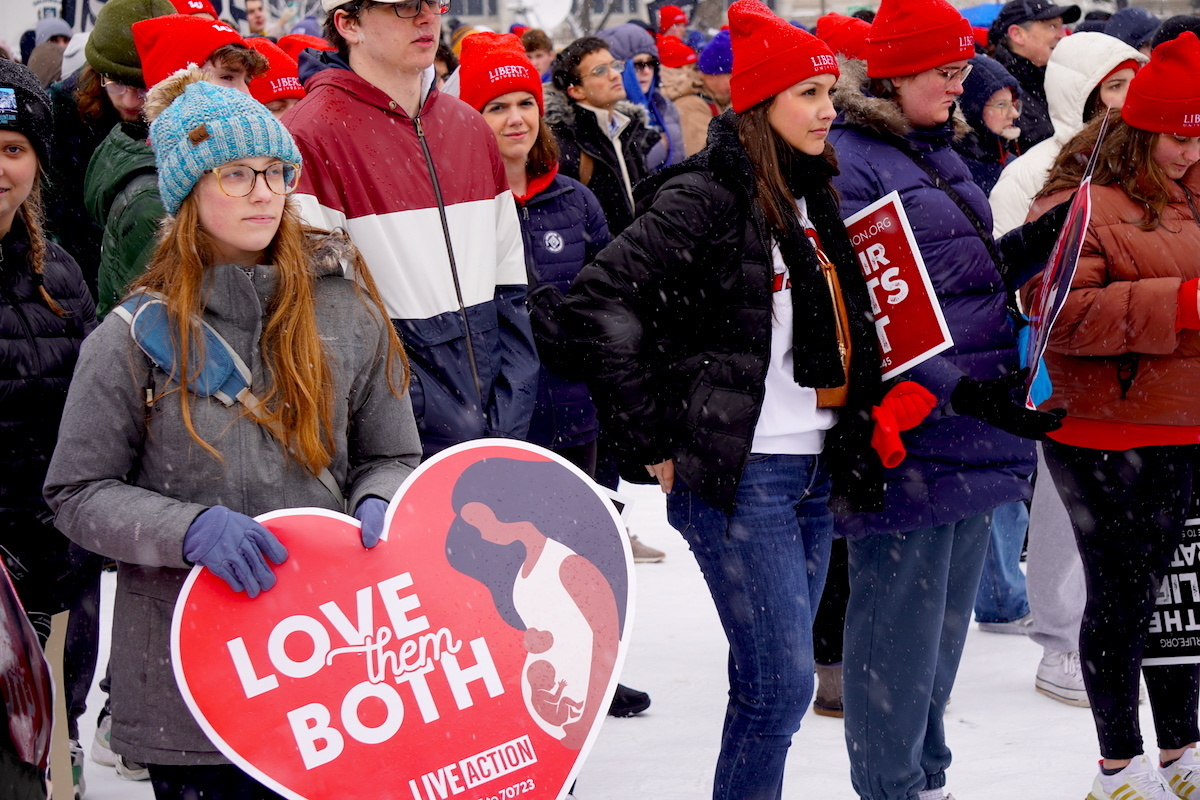
Here we go again. Every couple of months, another abortion abolitionist with a cult following on social media decides it’s time to burn women at the stake — only this time it’s pro-life women.
Scrolling through my X feed Wednesday night, I and over a hundred thousand others read social commentator Jon Root’s rant against Kristan Hawkins, president of Student for Life of America.
Root’s attack against Hawkins is, in part, over incrementalism. Incrementalists believe in working strategically over time to change laws and society’s views on abortion. Whereas abolitionists believe in a scorched earth, all-or-nothing approach, which usually leads to the latter: nothing. They also believe women who have abortions are not victims and should face prosecution for their crime of murder.
Hawkins is known for standing up for her sex, even when it means going up against powerful institutions, just as she did in 2017. That year, Hawkins defended a pregnant high school student who wanted to graduate with her senior class at Heritage Academy in Maryland. To the dismay of some Christians, Hawkins pointed out that the student had bravely chosen life and should be lauded for making that difficult decision when she could have hidden her sin and shame by having an abortion.
While Students for Life boldly states on its website that it seeks to “abolish abortion,” Hawkins and SFLA have acknowledged that although it’s not ideal, an incrementalist approach can move the ball forward. In 2022, when Sen. Lindsey Graham proposed a 15-week abortion ban, she said that while the 15-week ban was not a “goal,” it would be a step toward achieving a more pro-life society. However, a year ago this month she opposed the idea of a federal 16-week abortion ban, suggesting it was “lousy” because it would still allow up to 94% of abortions to be committed annually.
Amid the debate over abortion abolitionism versus incrementalism, it was Root’s public rebuke of Hawkins’ recognition that mothers are also victims of abortion that raised my ire, just as I was enraged last year when Meghan Basham criticized Karen Swallow Prior’s opposition to the abortion abolitionist view that women must be punished, even imprisoned. The opinion that women who have abortions should face “some form of criminal sanction” was championed by Al Mohler, president of Southern Baptist Theological Seminary, on his podcast, “The Briefing.” He argued that pro-lifers who don’t seek to punish mothers are exposing “an embarrassing shortfall” in their thinking, which fails to hold women to “moral accountability” for their actions.
Mohler offered similar commentary at the Southern Baptist Convention’s Annual Meeting in Anaheim, California, in 2022, when a couple of male messengers who seemed to harbor a disturbing hatred of women and an insatiable desire to see them suffer asked if he believed women who have abortions should be prosecuted, to which he indicated there should be some sort of punishment.
What stuck out to me was that while these messengers were righty grieved over abortion, it took them a long time to get around to acknowledging that women do not become pregnant on their own. And if one is going to punish mothers who have abortions, then surely the men — often hidden from view but frequently the person pushing the decision to terminate a pregnancy — should be held accountable too.
In 2015, Lifeway Research released the results of a study that found 7 in 10 women who had an abortion identified as Christian — that is a shocking and alarming statistic.
If abortion abolitionists had their way, these women would be in prison instead of freely available to be trad wives cooking their meals and ironing their shirts. I say this in jest, but it exposes the reality that abortion abolitionists fail to see that the very women they’re seeking to punish might be their friends, mothers, sisters, girlfriend or maybe even their wife — forced to grieve in silence rather than be free to confess her sin to her husband or Christian community, as James 5:16 tells us to do: “Therefore confess your sins to each other and pray for each other so that you may be healed.”
Like many of you, I was raised in a Christian home by loving parents who were active participants in my life and ensured I was at church on Wednesday nights and Sunday mornings, and back again for Sunday night Bible study. Unlike many of my friends in high school, I was staunchly pro-life. It was inconceivable to me how any woman could allow her baby to suffer a torturous death by having an abortion.
When I was in college, I often found myself immersed in heated abortion debates with roommates or anyone else who wanted to challenge me on the issue in our dorm room, which was often packed with opinionated friends who enjoyed discussing hot topics after a night out.
I never imagined that I, the girl who was staunchly pro-life — and still is — would later identify with the 7 in 10 Christian women who have had an abortion.
Unlike how Root defined it in his X post, I was not “unrepentant,” and I would not say I had the abortion “willingly.” However, I also do not deny that, ultimately, it was my responsibility to protect my child, regardless of the circumstances I was in. My actions in my 20s mirrored that of many of the Christian friends I grew up with — all living in different cities and involved in sexual dating relationships. Yet I, again, the one who was the most vocally pro-life, was the one who became pregnant out of wedlock.
Although my then-boyfriend and I were unequally yoked as a couple — as I learned too late that despite his being raised Catholic, he was not a believer, and we had opposing views on many significant issues — I was willing to get married and start a family. However, he saw the child as an impediment to his dreams of celebrity and fame.
Each week, I’d use his laptop and do a Google Search to find what the baby’s development stage looked like. My hope was that when he signed on and saw the image of what our pre-born baby looked like, he might change his mind. He never did.
When trips to visit my family and friends failed to persuade him to change his mind about our future, and his angst led to him making physical threats against me if I didn’t get an abortion, I relented. The pressure I was under from him and his friends to terminate was insurmountable.
I went to multiple abortion clinics. I left one clinic twice, telling the woman at the front desk that I couldn’t go through with it. But with each passing week, I was under immense pressure to abort because the cost of a surgical abortion increases by the day. The abortion was the most physically painful experience of my life. The atmosphere in the room was fully demonic, and my eyes were flooded with tears because I couldn’t stop crying, which angered the abortionist.
That night, faced with the reality of what I had done and the immense longing to be with my baby, I tried to take my life, but it failed. I have asked God for forgiveness for the abortion, but I’ve never been able to accept it.
I have never forgotten the age of the child on the day of the abortion: 14 weeks and five days. I also remember the age he or she would be today and that my due date was around Mother’s Day.
Every holiday, I’m keenly aware of the person who is missing in my life and why.
Today, I work for a Christian organization. I attend church and am surrounded by Christian friends, yet this is a secret I keep to myself — perhaps to avoid the “righteous judgment” that Root and the abolitionists seek to wield over their Christian sisters.
Margo Ramirez is a lifelong Southern Baptist and graduate student at Liberty University.






